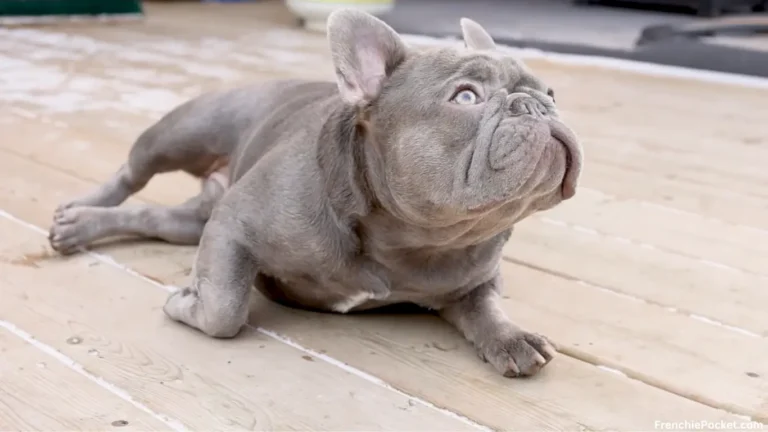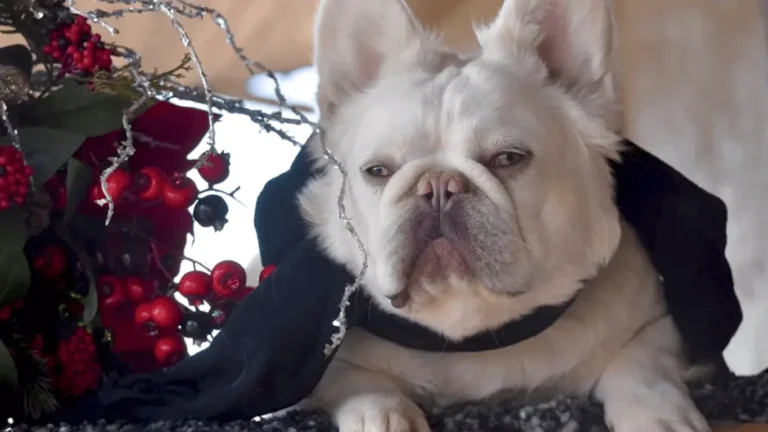Merle French Bulldog
A Merle French Bulldog is a unique and distinct breed, sporting an eye-catching merle coat pattern marked by striking, iridescent patches of color on its fur.

This extraordinary look results from the dominant merle gene, which causes a dilution of the black or liver pigment in the coat, leading to patches of blue or chocolate.
This genetic quirk creates a mottled, one-of-a-kind appearance, setting these dogs apart from the standard Frenchies. Although rare and not recognized by the official breed standard, Merle French Bulldogs continue to captivate and captivate dog enthusiasts everywhere with their distinctive and striking appearance.
Merle French Bulldog Traits
Merle French bulldogs are known for their unique coat coloring, characterized by a mottled or marbled pattern. Some of the critical traits of merle Frenchies include:
- Coat Color: The coat of a merle French bulldog can range in color from light blue to dark blue, black, and even chocolate.
- Eye Color: Merle Frenchies can have eye colors that range from blue to amber, green, or even heterochromia (different colored eyes).
- Personality: Like all French bulldogs, merle Frenchies are known for their affectionate, playful, and comical characters.
- Size: Merle Frenchies are a small breed, with a typical weight range of 16-28 pounds.
- Adaptability: Frenchies, including merle Frenchies, are an adaptable breed that can do well in both urban and rural environments as long as they receive adequate exercise and mental stimulation.

It’s important to note that a variety of factors, including genetics, environment, and individual temperament, can influence the traits of a merle French bulldog.
Color Patterns of Merle French Bulldogs
Merle Frenchies have a unique coat coloring characterized by a mottled or marbled pattern. The merle gene’s expression creates the pattern, affecting the coat’s pigment distribution. Some of the most common color patterns seen in merle Frenchies include:
- Blue Merle: A blue merle French bulldog has a light blue or gray base coat with darker blue or black marbling.
- Chocolate Merle: A chocolate merle French bulldog has a rich, chocolate-brown base color with light brown or tan marbling.
- Black Merle: A black merle French bulldog has a solid black base color with light gray or silver marbling.
- Sable Merle: A sable merle French bulldog has a light to medium brown base color with darker brown marbling.
It bears mentioning that the unique and striking hue of a Merle French Bulldog can significantly fluctuate, as it depends on the manifestation of the merle gene, which results from the interaction of genetics.
Genetics of Merle French Bulldogs
The merle gene dictates the mysterious genetics of Merle Frenchies, which serves as a magnificent painter’s brush, altering the pigment’s distribution in their skin and hair. This dominant gene fearlessly dilutes the deep black or liver hues, crafting a mesmerizing blue and chocolate patches mosaic.
The exact nature of the merle pattern’s genetics remains an enigma. Still, it’s believed to stem from a mutation in the SILV gene, the orchestrator of melanocytes’ production, the cells responsible for coloring their skin and hair.
It’s important to remember that the merle gene can bring along specific health concerns, such as impaired vision and hearing. In Frenchies, the merle gene is often a double-edged sword, as homozygosity, meaning the presence of both copies of the gene, amplifies its risks.
Therefore, breeders must delve into the depths of the merle pattern’s genetics and exercise responsible breeding practices to mitigate the hazards of the merle gene in French Bulldogs.
Double Merle French Bulldog
A double merle French bulldog is a canine cursed with a genetic makeup that befalls two copies of the “merle” gene. This fateful combination can bring about various health and visual disorders, including deafness, blindness, eye defects, and skin issues. Many breeders consider it a heinous practice linked to inbreeding.
The merle gene in Frenchies is dominant and bestows a captivating mottled or marbled pattern on their coat. Its expression can fluctuate greatly, leading to varying degrees of pigmentation loss.
A bulldog possessing a single copy of the gene earns the title of “single merle,” while owning two copies of the gene labels it as a “double merle.” The double merle genotype is synonymous with an increased risk of health concerns. Its amplified expression can result in a more pronounced loss of pigmentation in their coat, eyes, and inner ear, potentially leading to deafness and blindness.
Are Merle French Bulldogs purebred?
Merle Frenchies, often considered a mixed breed, is the result of breeding a French Bulldog with another dog that carries the merle gene, like a Chihuahua. Despite their distinctive and impressive appearance, the American Kennel Club doesn’t classify the merle French Bulldog as purebred, casting a shadow on its pedigree.

One can’t ignore the dangers of inbreeding and its potential health problems in the case of double merle (M/M) French Bulldogs. Breeding two double merles is a recipe for disaster.
Instead, responsible breeders who desire the distinctive merle pattern should pair a Merle (M/m) French Bulldog with a non-Merle (m/m) French Bulldog. This’ll result in a litter of half-Merle pups, ensuring a healthier and more diverse gene pool, without any double merle puppies, who are at a heightened risk of health issues.
Feeding Behavior
The feeding behavior of Merle French Bulldogs is similar to that of other Frenchies and dogs of their size. Feed them high-quality dog food suitable for their age, size, and activity level, and divide the portions into two to three smaller meals throughout the day.
It’s also essential to monitor their food intake to ensure that they don’t become overweight, as obesity can be a health concern for this breed. Treats should be given in moderation, and monitoring their overall caloric intake is essential. In addition to a balanced diet, providing access to fresh water is vital for their health.
Health Issues
Merle French bulldogs, mainly double merles, can be prone to various health issues due to the expression of the merle gene. Some of the most common health problems associated with merle Frenchies include:
- Deafness: Increased expression of the merle gene can lead to a loss of pigmentation in the inner ear, potentially causing deafness.
- Blindness: The merle gene can also result in a loss of pigmentation in the eyes, potentially leading to vision problems or blindness.
- Eye Defects: Merle Frenchies can also be prone to eye defects, such as cataracts and corneal dystrophy.
- Skin Problems: Merle Frenchies can have skin that’s more sensitive to sunlight and prone to sunburn, skin cancer, and other skin problems.
- Congenital Heart Disease: Merle Frenchies may be at a higher risk for congenital heart disease.
Although breeders know double merle Frenchies’ health challenges, the degree and frequency of these illnesses can vary greatly. However, many breeders believe that producing multiple merles is immoral and dangerous to these lovable dogs.
Ethical Concerns
Breeding merle French bulldogs have raised ethical concerns in the dog breeding community. Some of the main issues include:
- Health Problems: Double merle French bulldogs, mainly, are prone to various health problems, including deafness, blindness, eye defects, and skin problems. This’s led many to question the ethics of intentionally breeding dogs with an increased risk of health problems.
- Inbreeding: The production of double-merle Frenchies often requires inbreeding, which can result in a concentration of genetic problems and harm the breed’s overall health and well-being.
- Purposeful Breeding: Some breeders deliberately breed merle Frenchies to produce a unique appearance without considering the health and welfare of the dogs involved.
- Lack of Standardization: Merle Frenchies are not recognized as a standard color by most breed organizations, leading to confusion and inconsistencies in breeding practices.
These ethical concerns have led many breeders, veterinarians, and animal welfare organizations to discourage breeding double-merle French bulldogs and to promote responsible breeding practices that prioritize the health and welfare of the dogs.
Price

How Much Does a Merle French Bulldog Cost?
The price tag for a French Bulldog can fluctuate greatly, with numerous factors at play, such as the breeder’s geographical location, the puppy’s age, its lineage, and the current demand for the breed.
Due to their unique and eye-catching coloration, merle Frenchies fetch a premium price compared to regular Frenchies. A merle French Bulldog puppy typically ranges between $5,000 to $15,000. However, ethical and responsible breeders, who perform genetic health checks and provide adequate care and socialization, may charge even more. It’s a wise investment, as the reward of acquiring a healthy, well-adjusted furry friend is immeasurable.
It’s crucial to remember that the expenses of dog ownership go far beyond the initial purchase price. You must also allocate funds for ongoing costs such as food, veterinary care, grooming, and training. Hence, before deciding, ensure you have the financial means and time to commit to being a responsible pet parent.
How to Buy?
- Do Your Due Diligence: When searching for a Merle French Bulldog, you must do your due diligence and reputable research breeders who specialize in this breed. Scour the internet for reviews and recommendations, and ensure that you’re comfortable with the breeder’s breeding and health testing approach.
- Demand Health Testing: Merle Frenchies are prone to specific health issues, so choosing a breeder who takes the necessary steps to health test their breeding dogs is crucial. Feel free to ask for health certificates and information about the tests performed.
- Meet the Breeder: Arrange a visit to the breeder’s facility to meet the puppies and their parents. This hands-on experience will allow you to assess the dogs’ health, temperament, and living conditions.
- Check the Paperwork: Before purchasing, ensure you’ve all the necessary documentation, including registration papers, health certificates, and a sales contract. Read through the contract carefully, understanding all the terms and conditions, including any warranties and return policies.
- Brace Yourself for the Cost: Merle Frenchies come with a hefty price tag, with puppies costing anywhere between $5,000 and $15,000 or more. Make sure you’ve got a realistic budget in mind.
- Get a Contract: Make sure to secure a written contract with the breeder that clearly outlines the terms of the sale and the responsibilities of both parties.
- Consider Adoption: If you’re open, consider adoption through a reputable rescue organization. Although Merle Frenchies are rare in rescues, you may come across one in need of a loving home.
Frequently Asked Questions
Why are Merle dogs pricier?
Breeders and owners seek blue or red merles, making them rare and expensive. The unexpected gene makes merle dog breeding challenging. Merle dog breeders may need to be pickier to reduce health issues, which may raise prices. Breeding and demand raise merle dog prices.
Can you cross two merle Frenchies?
The union of two merle Frenchies has the potential to yield a litter where every fourth pup could be a product of double the merle gene. This results in a state referred to as a “double merle.” While the merle gene has a stunning effect on a dog’s coat, imbuing it with a beautiful marbling pattern and delicate lighter spots, it also carries inherent health risks.
Are blue eyes a consistent trait in merle dogs?
No, not all merle dogs have blue eyes. The color of a dog’s eyes is determined by multiple genes and can be influenced by factors such as coat color and pattern and other genetic factors.
What is the average lifespan of a merle Frenchie?
Like its solid-colored counterparts, the longevity of a merle French bulldog is subject to fluctuations determined by a medley of elements, including hereditary predispositions, sustenance, and physical well-being. Yet, in general, the typical French bulldog boasts a lifespan that spans a decent 11 to 14 years, on average.
Conclusion
The Merle French Bulldog is a visually striking breed with a mottled coat. Known for their affectionate, playful, and comical personalities, they weigh between 16-28 pounds. Merle genes can cause health concerns, and responsible breeding is necessary. The breed isn’t purebred, and double Merle Frenchies are at risk of health problems. Merle Frenchies are popular, but inbreeding risks are also considerable.







